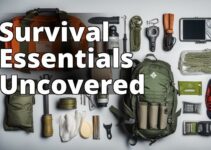In today's unpredictable world, being prepared for emergencies and disaster scenarios is more important than ever. Whether you're an outdoor enthusiast, a prepper, or simply someone who wants to acquire essential survival skills, e-books on survivalist techniques can be invaluable resources. These digital books offer a convenient and affordable way to learn about various survival skills, from wilderness survival to urban preparedness. In this ultimate guide, we will explore the benefits of using e-books for learning survivalist techniques and recommend some highly regarded titles to help you master the art of survival.
What readers will learn by reading this article:
- The basic principles and objectives of survivalist techniques.
- The benefits of using e-books for learning survivalist techniques.
- Recommended e-books on survivalist techniques, including their content and positive reviews.
- The U.S. Army Survival Guide's focus on medical skills for survival situations.
- Additional resources for e-books on specific survivalist techniques.
Overview of Survivalist Techniques
Survivalist techniques encompass a wide range of skills and knowledge aimed at ensuring your safety and well-being in emergency situations. The basic principles of survivalist techniques revolve around self-sufficiency, adaptability, and resourcefulness. The primary objective is to be prepared for any unforeseen circumstances, such as natural disasters, civil unrest, or even getting lost in the wilderness.
By acquiring survivalist techniques, you gain the ability to provide for your basic needs, including shelter, water, food, and security, even in challenging environments. These skills can help you navigate through unfamiliar terrain, start fires, build shelters, procure water and food, administer first aid, and protect yourself from potential threats.
Benefits of E-Books for Survivalist Techniques
E-books offer several advantages for individuals seeking to learn survivalist techniques. Here are some key benefits:
1. Convenience
E-books can be accessed and downloaded instantly, allowing you to start learning right away. With a digital device like a smartphone, tablet, or e-reader, you can carry an extensive library of survivalist e-books wherever you go. This convenience enables you to access vital information and reference materials whenever you need them, whether you're at home, in the wilderness, or during an emergency situation.
2. Portability
Unlike physical books, e-books take up no physical space and weigh nothing. This makes them highly portable, ensuring that you always have access to crucial survival knowledge, even when traveling or on the move. You can easily store numerous e-books on a single device, eliminating the need to carry bulky books or worry about running out of reading material.
3. Affordability
E-books are generally more affordable than their printed counterparts. With lower production and distribution costs, e-books often come at a fraction of the price of physical books. This affordability allows you to build a comprehensive survival library without breaking the bank. Additionally, many e-books offer free or discounted promotions, making them even more accessible to a wider audience.
4. Interactive Features
E-books often incorporate interactive features such as hyperlinks, videos, and images, enhancing the learning experience. These features can provide additional context, visual demonstrations, and supplementary resources to help you grasp complex survivalist techniques more effectively. You can also make use of search functions within e-books to quickly find specific information or keywords, saving you time and effort.
Recommended E-Books on Survivalist Techniques
When it comes to e-books on survivalist techniques, there is a wealth of options available. To help you get started, here are some highly recommended titles from different subgenres of survival:
“THRIVE: Long-Term Wilderness Survival Guide; Skills, Tips, and Gear for Living on the Land” by Richard L. Duarte
“THRIVE” is widely regarded as one of the best e-books on wilderness survival. It covers a broad range of topics, including shelter building, water procurement, food foraging, navigation, and gear selection. The book provides practical advice and step-by-step instructions to help you thrive in the wilderness. It has received positive reviews from survival experts, who praise its comprehensive coverage and practical approach.
“The U.S. Navy SEAL Survival Handbook” by Don Mann
If you're interested in real-life survival scenarios and learning from the techniques used by elite professionals, “The U.S. Navy SEAL Survival Handbook” is a must-read. This book focuses on the skills and tactics employed by Navy SEALs and covers a wide range of survival topics, including navigation, shelter construction, signaling, and self-defense. With detailed instructions and real-life examples, this e-book provides valuable insights into surviving in various environments.
“Bushcraft 101: A Field Guide to the Art of Wilderness Survival” by Dave Canterbury
For those interested in primitive skills and bushcraft techniques, “Bushcraft 101” is an excellent resource. The book emphasizes essential skills such as fire starting, shelter building, knife skills, and foraging. It offers step-by-step instructions and clear illustrations to help you master these fundamental survival techniques. Whether you're a beginner or an experienced outdoorsman, this e-book provides valuable insights into thriving in the wilderness.
“SAS Survival Handbook: The Ultimate Guide to Surviving Anywhere” by John ‘Lofty' Wiseman
Written by a former SAS soldier, the “SAS Survival Handbook” is considered a classic in the field of survival. This comprehensive guide covers a wide range of topics, including navigation, first aid, self-defense, and urban survival. The book combines practical advice with real-life examples, making it an invaluable resource for anyone seeking to acquire essential survival skills.
“Emergency: This Book Will Save Your Life” by Neil Strauss
“Emergency” takes a unique approach to survivalism by sharing the author's personal journey of preparing for various disaster scenarios. It offers insights into urban survival, self-defense, and building a network of like-minded individuals. The book combines practical advice with the author's experiences, making it an engaging and thought-provoking read for those interested in a different perspective on survivalism.
“The Prepper's Blueprint: The Step-By-Step Guide to Help You Through Any Disaster” by Tess Pennington
“The Prepper's Blueprint” provides a comprehensive approach to preparedness for any disaster. It covers a wide range of topics, including food storage, water purification, emergency medical care, and self-defense. The book's user-friendly format, including checklists and actionable steps, makes it an excellent resource for both beginners and experienced preppers.
The U.S. Army Survival Guide:
| E-Book Title | Author | Description |
|---|---|---|
| THRIVE: Long-Term Wilderness Survival Guide | Richard L. Duarte | Covers shelter building, water procurement, food foraging, navigation, and gear selection. Provides practical advice and step-by-step instructions for thriving in the wilderness. |
| The U.S. Navy SEAL Survival Handbook | Don Mann | Focuses on skills and tactics used by Navy SEALs. Covers navigation, shelter construction, signaling, and self-defense. Provides detailed instructions and real-life examples. |
| Bushcraft 101: A Field Guide to the Art of Wilderness Survival | Dave Canterbury | Emphasizes fire starting, shelter building, knife skills, and foraging. Offers step-by-step instructions and clear illustrations for mastering fundamental survival techniques. |
| SAS Survival Handbook: The Ultimate Guide to Surviving Anywhere | John ‘Lofty' Wiseman | Written by a former SAS soldier. Covers navigation, first aid, self-defense, and urban survival. Combines practical advice with real-life examples. |
| Emergency: This Book Will Save Your Life | Neil Strauss | Shares the author's personal journey of preparing for disaster scenarios. Offers insights into urban survival, self-defense, and building a network. Combines practical advice with the author's experiences. |
| The Prepper's Blueprint: The Step-By-Step Guide to Help You… | Tess Pennington | Provides a comprehensive approach to disaster preparedness. Covers food storage, water purification, emergency medical care, and self-defense. Offers user-friendly checklists and actionable steps. |
| The U.S. Army Survival Guide: Medical Skills, Tactics, and… | Department of Army | Focuses specifically on medical knowledge for survival scenarios. Covers first aid, field medicine, emergency response, and improvised medical care. Equips military personnel and civilians with valuable medical knowledge. |
Medical Skills, Tactics, and Techniques
In addition to general survivalist techniques, it is crucial to have a solid understanding of medical skills in emergency situations. “The U.S. Army Survival Guide: Medical Skills, Tactics, and Techniques” focuses specifically on medical knowledge for survival scenarios. It covers a wide range of topics, including first aid, field medicine, emergency response, and improvised medical care. This e-book equips military personnel and civilians alike with valuable medical knowledge to ensure their survival in challenging situations.
Personal Story: Putting Survivalist Techniques into Practice
When I first delved into the world of survivalist techniques, I was eager to learn everything I could to be prepared for any emergency situation. I started by reading various e-books on the subject, including “THRIVE: Long-Term Wilderness Survival Guide” by Richard L. Duarte. The book provided me with a wealth of knowledge on wilderness survival, from building shelters to foraging for food.
One summer, my friends and I decided to put our newfound survival skills to the test by embarking on a camping trip deep in the wilderness. We relied solely on the techniques we had learned through books like “Bushcraft 101” by Dave Canterbury. Armed with our knowledge, we confidently set out to build our own shelter using natural materials and started a fire using primitive fire-starting methods.
As we explored the area, we stumbled upon a stream, and I immediately remembered the water procurement techniques I had read about in “THRIVE.” With the help of a makeshift water filtration system, we were able to safely drink from the stream and stay hydrated throughout our trip.
One evening, we encountered a sudden storm that left us drenched and seeking shelter. Thanks to the skills we learned from “The U.S. Navy SEAL Survival Handbook” by Don Mann, we quickly constructed a waterproof shelter using available resources and stayed dry throughout the night.
Our camping trip was not without its challenges, but with the knowledge and skills we gained from these e-books, we were able to overcome obstacles and thrive in the wilderness. It was a true test of our preparedness and a reminder of the importance of being equipped with survivalist techniques.
Through these experiences, I realized that e-books are not just a convenient and affordable way to learn survivalist techniques, but they can also provide practical knowledge that can be applied in real-life situations. Whether you're a seasoned outdoor enthusiast or someone who simply wants to be prepared for emergencies, the knowledge gained from these e-books can truly be life-saving.
Additional Resources for E-Books on Survivalist Techniques
Apart from the recommended e-books mentioned above, there are numerous other resources available to further enhance your survivalist knowledge. Some notable examples include:
- “Wilderness Navigation: Finding Your Way Using Map, Compass, Altimeter & GPS” by Bob Burns
- “The Forager's Harvest: A Guide to Identifying, Harvesting, and Preparing Edible Wild Plants” by Samuel Thayer
- “The Complete Guide to Edible Wild Plants” by Department of the Army
- “100 Deadly Skills: The SEAL Operative's Guide to Eluding Pursuers, Evading Capture, and Surviving Any Dangerous Situation” by Clint Emerson
These resources cover specific survivalist techniques, such as wilderness navigation, food preservation, self-defense, and more. Each book offers unique insights and practical advice to expand your survival knowledge.
Conclusion
In conclusion, e-books on survivalist techniques provide a valuable and accessible way to learn essential skills for emergency situations. They offer convenience, portability, and affordability, making them a practical choice for individuals interested in acquiring survival knowledge. By exploring recommended e-books and additional resources, you can start building your knowledge and skills to master the art of survival. Remember, preparation is key, and these e-books can serve
Common Questions
Q.What are survivalist techniques?
A.Survivalist techniques are skills and strategies used to survive in challenging or extreme conditions.
Q.Who can benefit from e-books on survivalist techniques?
A.Anyone interested in learning how to survive in emergency situations can benefit from these e-books.
Q.How can e-books on survivalist techniques be helpful?
A.These e-books provide practical knowledge, tips, and strategies to increase survival chances in various scenarios.
Q.What if I have limited outdoor experience?
A.E-books on survivalist techniques cater to beginners and provide step-by-step instructions to help you learn and improve.
Q.How can I access e-books on survivalist techniques?
A.E-books can be easily accessed and downloaded from online platforms, allowing you to learn at your own pace.
Q.What if I prefer physical books over e-books?
A.While e-books provide convenience, many survivalist technique books are also available in physical format for those who prefer it.
John Andrews is an experienced survivalist with over 15 years of practical knowledge in wilderness survival. His passion for the outdoors and interest in self-reliance led him to become an expert in survivalist techniques.
John has honed his skills through extensive training and hands-on experience in various environments, including deserts, forests, and mountains. He has successfully applied his survivalist techniques in real-life situations, proving their effectiveness and adaptability.
In addition to his practical expertise, John has also dedicated himself to extensive research on survivalist techniques and the most effective ways to teach and share this knowledge with others. He has studied a wide range of resources, including books, articles, and scientific studies, to ensure that his methods are based on the most up-to-date and reliable information available.
John's passion for teaching and helping others has driven him to write several e-books on survivalist techniques. Through his e-books, he aims to empower readers with the knowledge and skills needed to thrive in challenging outdoor situations. His expertise and dedication make him the perfect guide to help readers master survivalist techniques through e-books.





